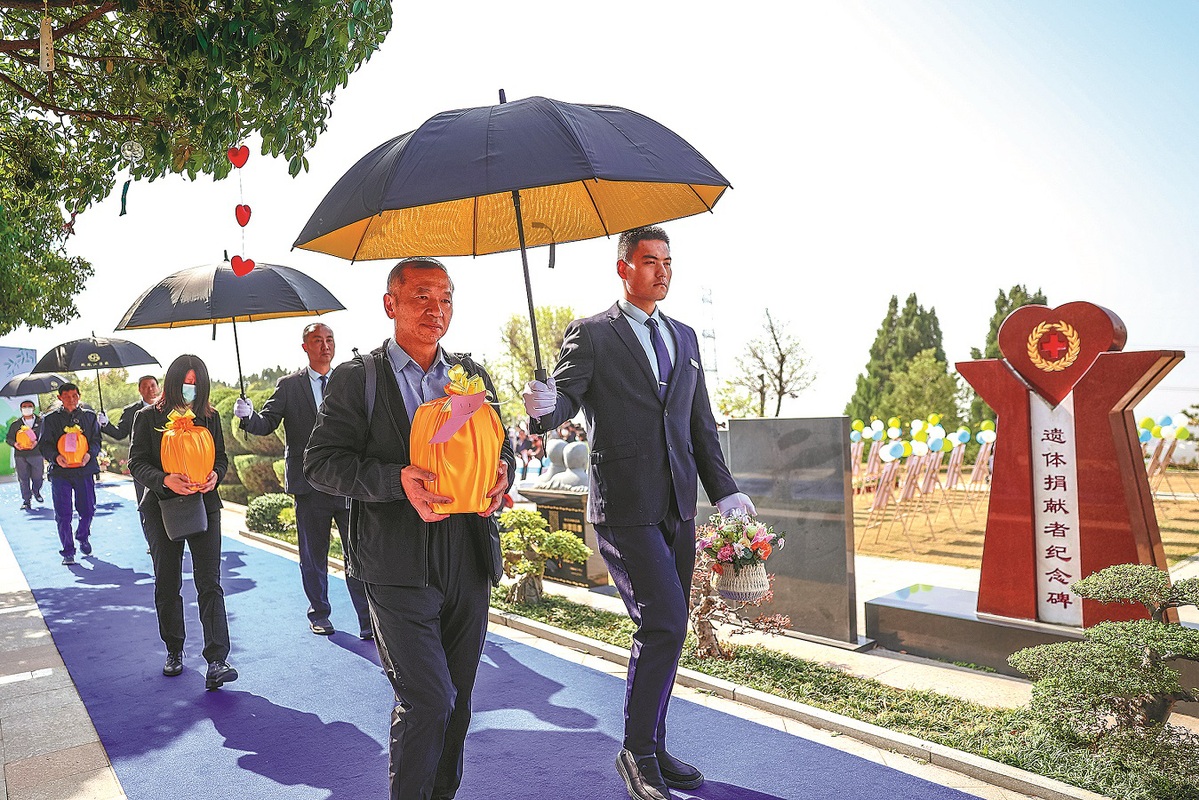
Funeral workers lead relatives of the diseased in a collective tree burial ceremony at Phoenix Mountain cemetery in Luoyang, Henan province, last month. CHEN JIE/FOR CHINA DAILY
In a quiet corner of Phoenix Mountain Ecological Cemetery in Luoyang, Henan province, a memorial ceremony was held in late March next to rows of white pines and golden osmanthus trees. Beneath the trees lie the remains of 229 people, who were interred not in traditional tombs but in biodegradable urns designed to return to the earth.
Since its inception in 2016, the cemetery's eco-burial initiative "I Wish to Become a Tree" has offered a free, environmentally friendly alternative to conventional burials. The project was among the first in the city to promote the concept of tree burials, where ashes are interred under trees instead of in large stone graves, said Cui Zhenyu, deputy marketing director of the memorial park.
In 2016, the Ministry of Civil Affairs and eight other government departments issued guidelines promoting ecological burials that save land. "But even before the policy, we had already started exploring this idea," Cui said.
It began with a local writer searching for a dignified resting place for his late wife. Disheartened by the bustle of scenic spots, he approached the memorial park with the idea of a tree burial. "He believed memorials should be about remembrance, not monuments," Cui said.
The cemetery's authorities agreed with the eco-friendly and land-saving funeral rites, seeing it as a future trend in the industry and pioneering the idea in Luoyang, he added.
A collective tree burial ceremony has since been held each year ahead of Qingming Festival, or Tomb Sweeping Day, providing interment services for applicants.
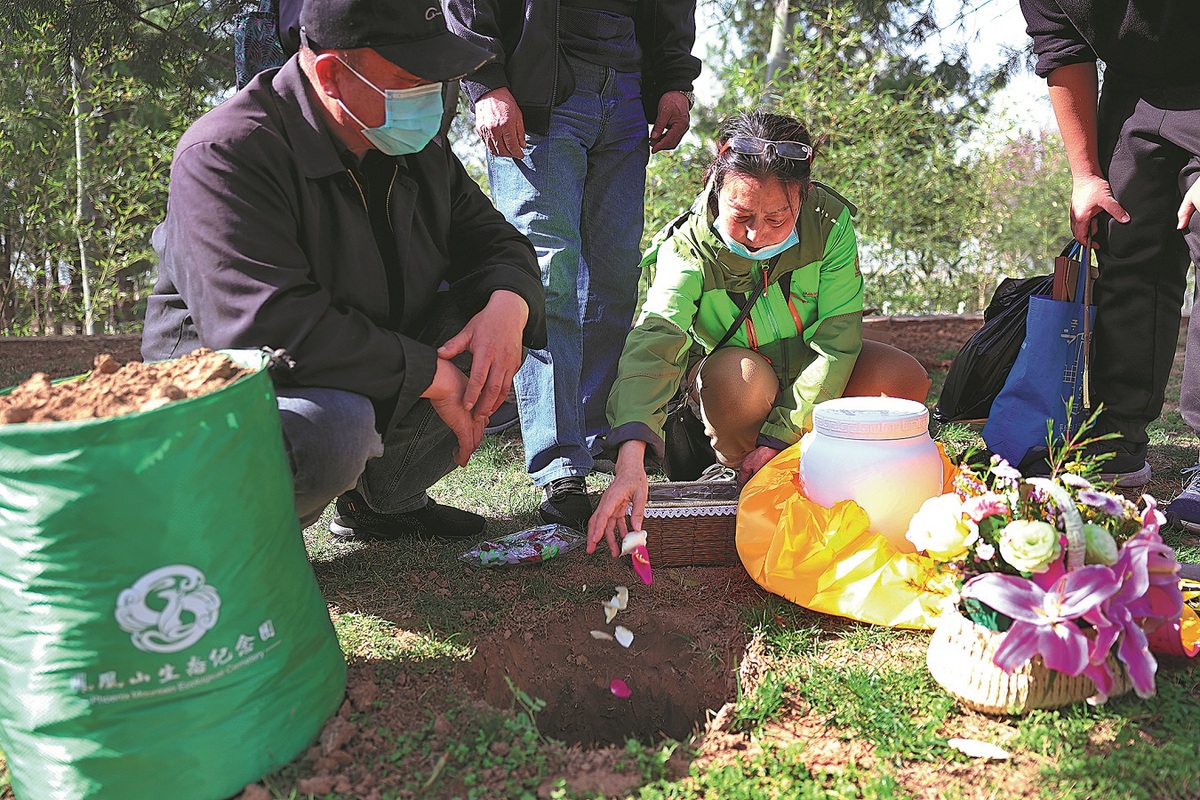
Flower petals are laid with the remains of the diseased during a tree burial ceremony. CHEN JIE/FOR CHINA DAILY
Returning to nature
In recent years, China has been promoting eco-burials, with many regions introducing public benefit policies. With a change in attitudes toward life and death, an increasing number of people are choosing green methods such as sea and tree burials. Returning to nature has become a new trend in funeral practices.
At the Phoenix Mountain memorial park, each urn is crafted from biodegradable materials designed to dissolve over three to five years, allowing the ashes to integrate naturally with the soil and the burial plot to be reused.
The park is home to over 20 white pines and 100 golden osmanthus trees. "Pines symbolize enduring life. Osmanthus trees bloom with a sweet fragrance every year, as if those who rest here are still contributing to the environment," Cui said.
Each tree accommodates up to eight urns, and families can locate their loved ones via a meticulously maintained memorial wall. "If family members want to visit, they can find the exact tree where their loved one rests," Cui said.
"In a culture where burial traditions run deep, the gentle accommodation matters," he said.
At first, only a handful of families participated, Cui recalled. "Now, we see more families actively inquiring about it, especially among well-educated older adults who see tree burial as a meaningful final contribution to society," he said.
In the past, some elderly people with no descendants had opted for free eco-burials because they didn't need a place for family visits and the service was not an economic burden. "But more families are choosing this because they genuinely believe in the values it represents," Cui said.
Traditionally, Chinese culture has emphasized large, grand tombs as signs of filial piety. But this idea has gradually changed as people realized that love and respect are not measured in square meters. "Families are starting to see that commemoration is about memory, not monuments," Cui said.
He recounted the case of a woman who donated her body for medical research and had her ashes laid to rest beneath a tree. "She and her husband made an agreement before she passed," Cui said, adding that her children have since expressed a wish to follow in her footsteps.
Younger generations no longer see death and funeral rites as bad luck or filled with fear, nor do they avoid talking about the issue, especially in big cities such as Beijing, Shanghai, and Guangzhou, Guangdong province, Cui said.
Residents with household registration in Beijing who choose sea or natural burials for cremated remains can use six free funeral services provided by funeral homes in the city, according to a circular recently released by the Beijing Municipal Civil Affairs Bureau. The services are: body grooming, refrigeration, transportation, a farewell ceremony, cremation and temporary ashes storage.
For those who choose a natural burial, the government provides a subsidy of 4,000 yuan ($550) per set of ashes to service providers to cover biodegradable urns, farewell ceremonies, and burial ceremonies for the deceased, it added.
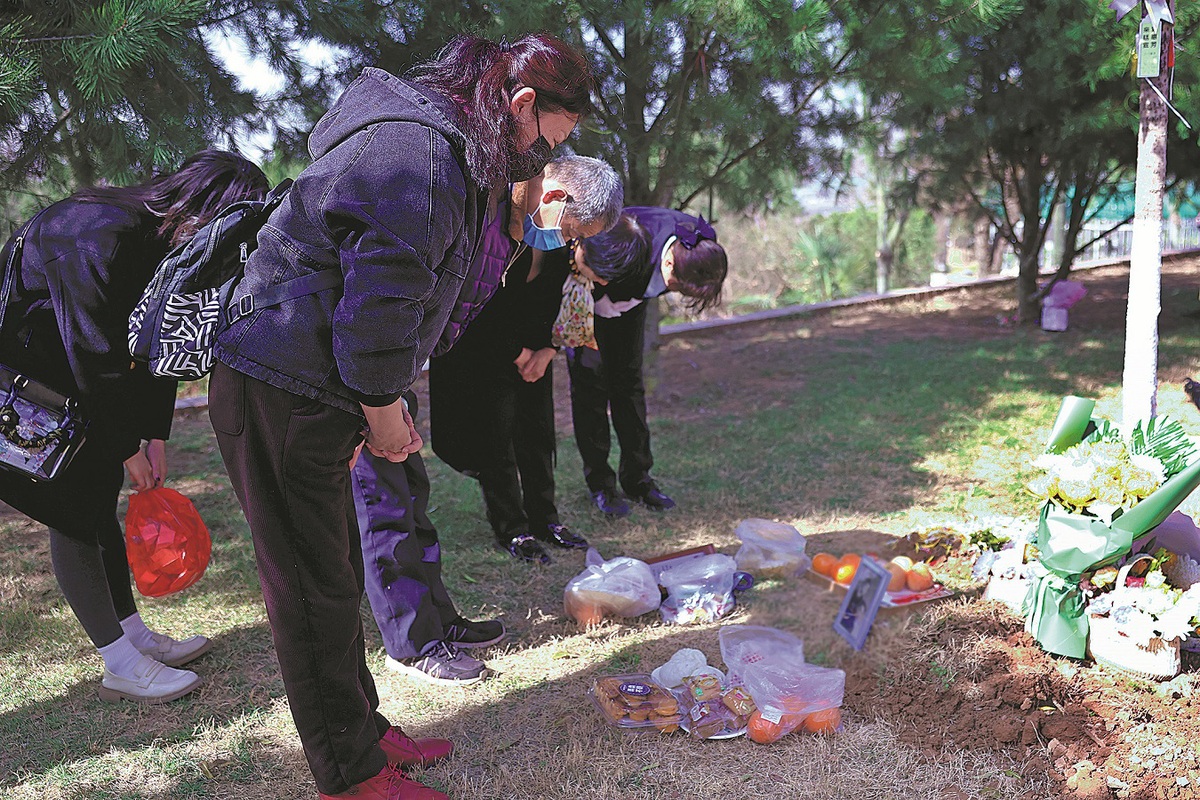
Relatives bow to pay respect to the diseased at the ceremony. CHEN JIE/FOR CHINA DAILY
Heaven can wait
Earlier this year, 32-year-old Song Yunfang and her family joined a waitlist at Taiziyu Cemetery to have their grandfather's remains buried under a tree. The cemetery is one of a few designated hubs for free ecological interment under the municipal bureau.
"My grandfather had expressed that he didn't want to be confined to a specific place and preferred a more natural and free approach," Song said.
"We also felt that maintaining a traditional grave required regular visits and upkeep, which could be challenging with family members living abroad."
The family was told that it could take a year to find a place for their grandfather in a collective burial ceremony, due to high demand. About 60 families usually participate in the monthly ceremony from May to October, according to Song.
Once notified about the ceremony, the remains are temporarily stored at an office under the management of Beijing Funeral Service, then transferred to Taiziyu. There's no specific tree or marked location for an individual buried at the cemetery. However, there is a shared space where families can leave flowers or pay their respects in a communal area.
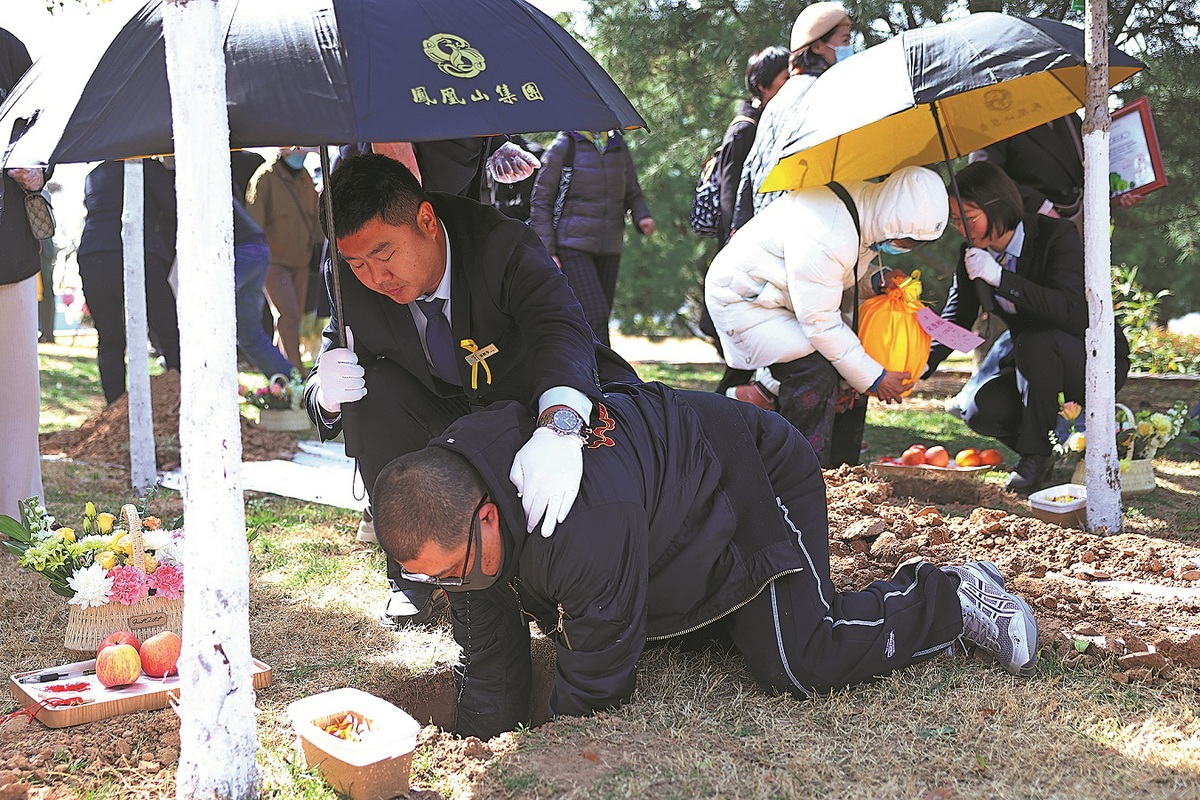
Urns are placed in pits during a tree burial ceremony at the cemetery in Luoyang last year. CHEN JIE/FOR CHINA DAILY
This approach meets with growing environmental consciousness and changing perceptions of death. "It's not about having a grand monument, but cherishing the memories and values our loved ones left behind," Song said.
Song's family had maintained a conventional grave for their grandmother, who passed away in 2006. However, with the plot's lease expiring next year, the family has decided to transition to a tree burial for both grandparents.
"We used to think that a large tombstone signified respect. But now, we feel that showing love and care while our family members are alive matters more. Remembering them fondly in our hearts is the truest way of paying tribute," she said.
Some of Song's friends have been inspired by her experience and are now considering tree burials for their loved ones.
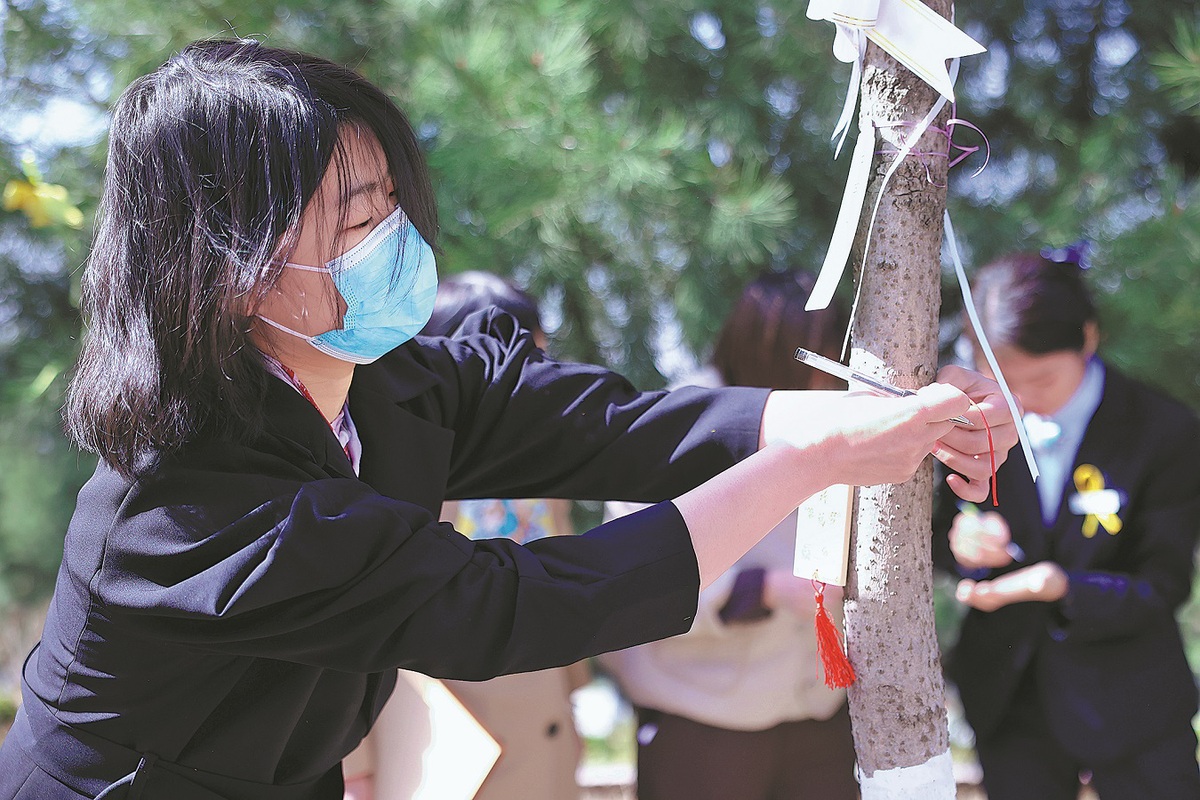
A relative ties memorial paper bow ties to trees during a tree burial in Luoyang, Henan province, last year. CHEN JIE/FOR CHINA DAILY
Li Yang, a funeral consultant based in Beijing, said families can also pay for tree burials at some local memorial parks to avoid long waiting times, with prices ranging from around 10,000 to 100,000 yuan. Relatives can spend more to have a loved one buried in a special location or interred under their own tree, he said.
Some parents of deceased children find flower bed burials appealing because their child loved flowers, while others shun traditional tombstones as they can appear frightening to youngsters, Li added.
Despite growing acceptance, ecological burials remain a small segment of China's funeral industry. Statistics from civil affairs authorities show that the proportion of eco-burials has risen to 3.2 percent, Xinhua News Agency reported last year.
Given that elaborate tombs and large burial plots are seen as a sign of filial piety in Chinese tradition, many people may consider eco-burials too simplistic and lacking in respect, said Cui from the cemetery in Luoyang.
"But over time, as more people see how much thought and care go into the ceremonies, they will begin to understand," he said.
Zhou Wenbo contributed to this story.